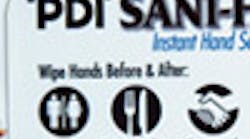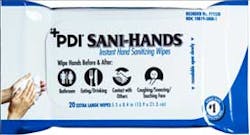The easy-to-understand illustrations are also ideal for non-English speaking patients, and are compliant with the U.S. Centers for Disease Control and Prevention (CDC) and World Health Organization (WHO) recommendations for hand hygiene.
Patient and visitor hand hygiene is often overlooked in the hand hygiene programs of many health-care facilities. According to the CDC, hand hygiene is the single most important intervention to reduce the spread of infections. Moreover, patients' own skin flora has been identified as a major source of infection transmission. Beyond the importance to provide a patient with a hand sanitizing product, it is equally important to educate them on when and how to sanitize their hands during their stay.
“Our goal is to continually innovate ways to better meet the needs of the healthc-are provider while offering cost-effective solutions for the facilities,” said Dan Marsh, executive vice president for PDI. “This improvement to the bedside pack packaging serves as the foundation of a broader relaunch of the Sani-Hands line of packaging that empowers patients to play an active role in their own care.”
Recent legislation has placed a larger emphasis on patient satisfaction. Reimbursements to hospitals will now be based on a pay-for-performance model, with 30% of that performance based on patient experience via Hospital Consumer Assessment of Healthcare Providers and Systems scores (HCAHPS). Optimizing patient hand hygiene and communicating with patients about their care may lead to more positive patient experiences, ultimately leading to higher patient satisfaction scores.
Sani-Hands Bedside Pack contains 20 wipes. Containing 65.9% ethyl alcohol, the wipes come in a convenient resealable pack and are an effective hand sanitizer that kills 99.99% of germs when soap and water is not available. Sani-Hands is clinically proven to be more effective than gels alone. The friction of the wipe removes dirt and soil, leaving hands both clean and sanitized. The formulation contains moisturizing aloe and vitamin E to help prevent drying.
PDI helps reduce preventable infections, control health care costs, and ultimately help save lives by delivering a broad range of evidence-based, market leading environmental hygiene and patient care solutions. For more information, visit www.pdipdi.com/healthcare.
RELATED:A look at the new CDC guidelines







